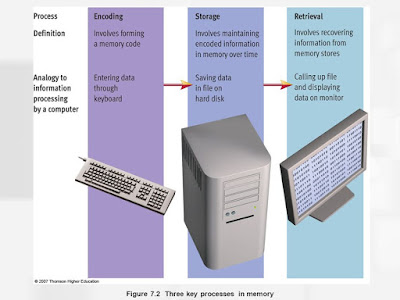Thinking and intelligence
Thinking
-
Refers to attending to
information and representing it mentally. For example making sense of and
change the world.
Mental images
-
Can be defined as pictures in
the mind or a visual representation in the absence of environment input. For
example, day dreaming and the mental visualization that occurs while reading a
book.
Concept
-
A mental grouping of similar
things, events and people that is used to remember and understand what things
are, what they mean and what categories or groups they belong to. For example,
if I say to you, “think of a car” the concept car will evoke some ideas in your
head about what a car is and what types of characteristics it contains.
Problem solving
-
Using thoughts and actions to
move from the current state to the goal state, in other words achieving a
desired goal that is not readily attainable often by devising strategies to
overcome obstacles.
-
Three types of problem solving:
1.
Trial and error
-
Continue trying different
solutions until problem is solved. For example, restarting phone, turning off
WIFI, turning off Bluetooth in order to determine why your phone is
malfunctioning.
2.
Algorithm
-
Step-by-step problem solving
formula. For example, instruction manual for installing new software on your
computer.
3.
Heuristic
-
General problem ssolving
framework. For example, breaking a task into steps.
Factors that affect problem solving
·
Expertise
·
Insight
·
Mental sets
·
Incubation
·
Functional fixedness
Intelligence
The ability to
benefit from past experience, act purposefully, solve problems and adapt to new
situations.
Spearman’s
theory of intelligence
·
G factor - the ability to reasons and solve problems,
or general intelligence. For example, a person who does well on a verbal test
would probably alsodo well on other tests.
·
S-factor – the ability to excel
in certain areas or specific intelligence
Gardner’s multiple intelligence
-
Gardner proposed that people
vary in their profile of 8 distinct forms of intelligence.
Triarchic theory of intelligence
-
Robert Sternberg proposed that
distinguished among three aspects of intelligence.
·
Componential intelligence
(analytic)
-
The ability assessed by
intelligence test. For example, comparing, analysing and evaluating an
information.
·
Experiential intelligence
(creative)
-
The ability to adapt to new
situations and produce new ideas. For example, inventing solution to new
problems and transfer the skills on have on a new situation.
·
Contextual intelligence
(practical)
-
The ability to function
effectively in daily situations. For example, dealing with everyday tasks
relating to world.
Emotional intelligence
-
The ability to identify and
manage your own emotions and emotions of others.
Videos for further references:








Comments
Post a Comment